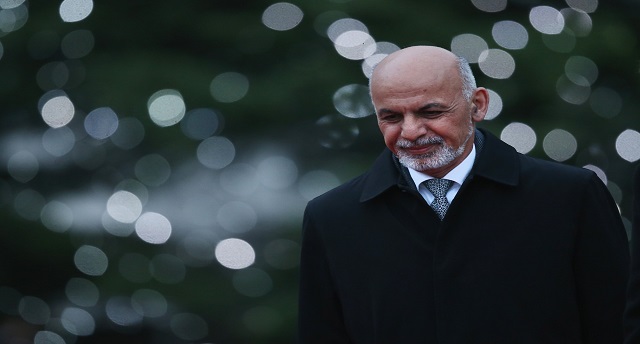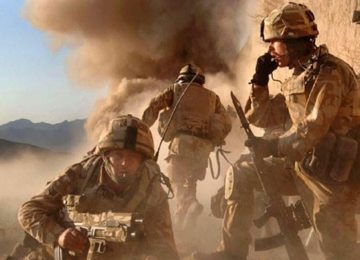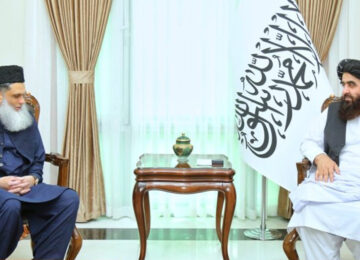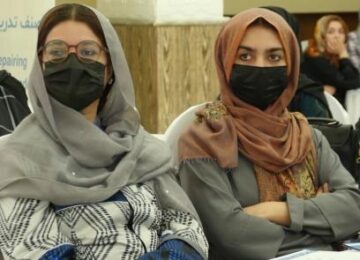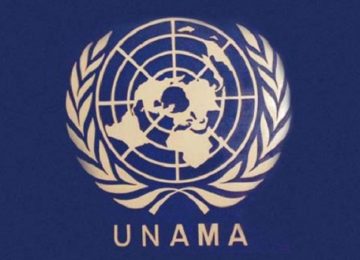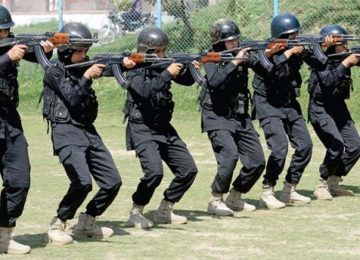June 10, 2019
Kabul has been on heightened security alert, as the presidential term of President Ashraf Ghani approached its constitutional end on 1 Jawza (22 May 2019). The authorities responded to calls by the political opposition for Ghani to step down in favour of a caretaker government and threats that protestors would take to the streets by increasing security forces in the capital – literally – overnight. Containers were put in place, in case they were needed to block roads, and access to the palace was restricted, resulting in massive traffic jams and public exasperation. AAN’s Ali Yawar Adili and Jelena Bjelica (with input from Martine van Bijlert) unpack the events that led to this week’s political and traffic tensions in Kabul, lay out the contours of the proposed caretaker government, and explore whether Ghani has successfully secured an extension of his tenure until the next election scheduled for 28 September 2019 takes place.
A critical date leads to a brief closure of the city
On 20 May 2019, a group of presidential hopefuls, who call themselves the Council of Presidential Candidates, called a press conference and warned that, if President Ashraf Ghani did not step down on 22 May – the day his term officially ended – the country would face a crisis and the president should face the consequences (media report here). The council was formed by 11 out of the 18 presidential runners in April 2019 in response to the delay in the presidential elections and what they saw as the unconstitutional extension of Ghani’s presidential term (see AAN analysis here) following a Supreme Court ruling that President Ashraf Ghani and his vice-presidents could continue to serve until the election of a new president.
In response to the perceived threat of possible mass demonstrations, Afghan security forces started increasing their presence throughout Kabul from Monday night (20 May) onwards. During the night between Tuesday and Wednesday, they positioned large trucks and containers at strategic positions, so they could block roads in the city, if necessary. In the early morning of 22 May 2019, the security forces also closed off certain roads leading to the presidential palace. This caused heavy traffic congestion in the capital and forced many residents to walk long distances. Samiullah, one resident of Kabul, told media that “all the oppressions and troubles befall the poor residents of Kabul.” He said he had had to walk from near the Ministry of Commerce, close to Darul Aman, all the way to Shahr-e Now because the roads were closed. Munir Ahmad, another Kabul resident, told media “there are trailer trucks stationed everywhere. The roads are closed.” AAN staff members, as they came to the office in the morning, also observed containers placed at many critical T-junctions in Kart-e Parwan, presumably in preparation for closing these roads if protests erupted. The spokesman for the Ministry of Interior, Nusrat Rahimi, later during the day, confirmed this had indeed been done in preparation for possible demonstrations.
Not surprisingly, discontent with the blockage of the city by the security forces was high and the issue widely discussed on social media. Some complained that they had faced violence by the security forces. Others said they had not been able to arrive on time for important appointments. The street closures were also heavily criticised by the opposition. The Council of Presidential Candidates issued a statement (see here) damning the road closures, by what they called “the illegitimate leaders of the government.” Trying to play on people’s emotions, they said “in this holy month of Ramadan and in the hot weather, the dreadful and frantic environment of the capital and the heavy presence of military forces in the city has led to disquiet and harassment of the citizens and is an especial cause of concern for the residents of the capital.” Individually, Enayatullah Hafiz, one of the presidential candidates, wrote on his Facebook page that, even though they had “not yet taken any practical action to overthrow the two-headed government, the government is afraid of its own shadow and has blocked the squares leading to the palace.”
Former Balkh governor and executive chief of Jamiat-e Islami, Atta Muhamamad Nur, who backs Atmar’s presidential ticket, released a video message on the same day (see here), “Today, the National Unity Government no longer exists.” He argued that it had not derived its legitimacy from the law, but from a political deal between the two sides (the two 2014 presidential candidates) and support by the international community and that this legitimacy no longer existed. He called on “all countrymen, supporters of the team, law-abiding people and those who like a lawful society to make all their preparations, starting today with coordination and consultation under the roof to pouring into the streets and after Eid, blocking highways and shutting down the ministries and [the area] around the presidential palace, as well as the provinces if needed.” He called on them “to be firm in their decision [to form] a big national movement until this imposed and dictatorial government collapses.” They did not want to trouble the people during the month of Ramadan, he said, but would make their move in the days thereafter.
After several hours of the roads being closed, the Kabul police realised there would be no demonstrations and, to avoid further public anger, directed they be reopened (media report here). A spokesman for Kabul Police Chief Ferdaws Faramarz told the media that all roads and squares had been reopened to traffic on the direction of Kabul chief of police (media report here).
Opposition demands for a caretaker government
Political pressure had been mounting in the capital since the first delay to the presidential elections was announced on 30 December 2018 when the date was moved from 20 April to 20 July 2019. (1) That delay sparked a debate about what to do with the end of the presidential term. This intensified when, on 20 March 2019, the Independent Election Commission (IEC) announced a second delay, moving the elections from 20 July to 28 September 2019.
On 15 April 2019, 11 out of the 18 presidential tickets (read AAN’s previous report about the 18 presidential tickets here) united around a call for the government to be dissolved after 22 May, its limit under the constitution. (2) They said they would finalise an alternative plan for the government, which they would announce in a press conference, “in light of the laws and in accordance with lawyers, politicians, civil society and other segments of society at the very earliest possibility.” It then took them almost a month to come up with a proposal for a caretaker government to replace the National Unity Government. By that time, 22 May was only ten days away.
The Council of Presidential Candidates’ statement proposing a “Caretaker Government within the Framework of the Islamic Republic of Afghanistan” (see Dari text here) presented two options:
- If the current president withdrew his candidacy for the presidency, he could continue to serve as head of the caretaker government, starting from 1 Jawza 1398 (22 May 2019), without going through any other legal mechanism and without any disruption, until the end of the caretaking period. They said this option would also apply to the current vice-presidents if they withdrew from the electoral race. (Second Vice-President Sarwar Danesh is running as the second running-mate of President Ashraf Ghani and First Vice-President Dostum has put his chief of staff, Enayatullah Babar Farahmand, on Chief Executive Abdullah’s ticket as his first running-mate. Dostum backs Abdullah. It is not clear whether, in this scenario, the Council would demand Dostum also either withdrew his support for Abdullah, or step down as vice-president.)
- If the first option did not materialise, they said a “bigger political consensus” should select the caretaker president and vice-presidents. Under this option, presidential candidates and personalities who were legally-qualified, independent, committed and with national wejahat (reputation, popularity), and who had been introduced by political parties and civil organisations registered with the Ministry of Justice, could become candidates for the post of head of the caretaker government. Any presidential candidate who wanted to run for the caretaker position should withdraw their candidacy for the presidency.
If the second option materialised, candidates for a caretaker leader would be introduced to the ‘big political consensus’ for a vote. They would present their proposals, after which the candidate who received the majority of the votes would be sworn in, in accordance with article 63 of the constitution (which describes the oath of office). The same method would apply to candidates for the positions of caretaker vice-president. (The proposal, however, does not specify whether the ‘big political consensus’ should vote for a ticket or for individuals who are candidates for the three posts).
In a more detailed written proposal (AAN has obtained a copy), the council defined the ‘big political consensus’ as being composed of: presidential candidates; leaders of political parties registered with the Ministry of Justice; the head of the Ulema Council of Afghanistan; the speaker and administrative board of the Wolesi Jirga; the chair and administrative board of the Meshrano Jirga; the head of the Afghanistan Independent Human Rights Commission; the head of the Independent Commission for Overseeing the Implementation of the Constitution; a representative of the civil society; the head of Afghanistan Lawyers’ Association and; the head of the Afghan Women’s Network.
The council listed three main tasks, which they call led “three big national programmes” for the caretaker government to manage: 1) transparent, fair and credible elections 2) a national reconciliation process and 3) the transfer of power to the next elected government.
They also described eight principles for the caretaker government:
- The caretaker leader should be an independent personality with national wejahat (reputation and popularity) and a commitment to efficiently fulfilling their duties.
- S/he should fulfil conditions similar to (hamgun) those enshrined in article 62 of the constitution for the presidential candidates (ie be a citizen of Afghanistan, Muslim, born of Afghan parents and not be a citizen of another country; not be less than 40 years old on the day of candidacy; not have been convicted of crimes against humanity, a criminal act or have been deprived of his/her civil rights by a court and; have not been elected as president for two terms). The last condition would disqualify former president Hamed Karzai and his vice-president Karim Khalili from running for the caretaker positions.
- The caretaker head of government should be selected based on a democratic vote and majority votes according to the conditions and options described in the Council’s proposal.
- The caretaker head of government should not be a presidential candidate; if presidential candidates run for the post of caretaker head of government, they should withdraw their candidacy for the presidency before running for the caretaker post, in order to ensure legal equity with other citizens.
- The caretaker head of government should not fulfil any other big major duty, ie is equal to those of a minister or judicial officer at the high levels in the government, for a period of time (until the next elected government is elected.)
- The tenure of the caretaker government is until the 6 Mizan 1398 (28 September 2019) elections have taken place and final results been announced. The caretaker head of government should then hand power to the [new] elected president.
- The performance of the caretaker head of government should be overseen by the Council of Presidential Candidates (which will be renamed as the Shura-ye Maslahat-e Melli (Council of National Exigency) after 1 Jawza 1398 or 22 May 2019).
- The authorities of the caretaker head of government should be specified in accordance with article 67 of the constitution. (It describes a situation in which the president resigns, or is impeached, or dies, or develops an incurable illness impeding the performance of his/her duties, and the first vice-president assumes the authorities and duties of the president. In this case, the first vice-president governs in an acting capacity and cannot amend the constitution, dismiss ministers or call a referendum.)
Building pressure and reaching out
On 19 May 2019, the Council of Presidential Candidates presented their proposals to the diplomatic community. The gathering was held in Ahmad Wali Massud’s house and was attended by representatives from the US, UK, France, Italy, Russia, Pakistan, Japan, the Netherlands, India and Tajikistan, and UNAMA, NATO and the Agha Khan Foundation. Ahmad Wali Massud, one of the presidential candidates, and Jawid Ludin, a member of the technical team of the Council of Presidential Candidates, presented the proposal (a link to the presentation in English is here).
Wali Massud and Ludin argued that the formation of the National Unity Government had been based on an agreement “signed by two individuals under international auspices” which, they said, had long been breached at its core and was no longer valid. They said that, for example, on the basis of article two of the Joint Statement of 8 August 2014 and its attachments, a Loya Jirga should have been convened after two years to debate amendments to the constitution and the creation of a post of executive prime minister. Yet, no Loya Jirga had been held, and similarly, many other commitments in this agreement had not been implemented.
They described a three-pronged strategy if the government were to continue post-22 May:
- Advocacy: if the government continued to serve after 22 May, they would work together to advocate for the government to step down and allow the formation of a non-partisan caretaker government;
- Pressure: they would reach out to the entire political spectrum of the country to build a grand political consensus in support of their demands and use this political consensus to apply continued pressure on the government;
- Protest: as a last resort and should the president continue to ignore their demands and his constitutional duty to ensure a level playing field for the presidential elections, they would engage in peaceful protests and, if necessary, actions of civil disobedience. (3)
At a press conference the following day – which was two days before the constitutional end of the presidential term – the Council of Presidential Candidates reiterated the need for the president to step down on 22 May. Former national security adviser and presidential hopeful Hanif Atmar saidthat, if Ghani continued to “violate the constitution, abuse the system, pressure the Supreme Court to provide opinion and pressure and abuse the security and defence forces, instability was inevitable.”
In response to this, presidential spokesman Harun Chakhansuri wrote on his Facebook page that “the only authority to interpret the constitution is the Supreme Court. [A]ny so-called caretaker or interim government is against the constitution and the system.” (4) Earlier, on 20 May, Vice-President Danesh’s legal board had published a detailed analysis of the legal foundations of the continuation of the National Unity Government on the Daily Afghanistan-e Ma website, which he owns. He had also published a commentary about the caretaker government proposal on 16 May. His arguments were mainly in line with the 2009 and 2019 rulings of the Supreme Court, as well as the 2014 legal opinion by the Independent Commission for Overseeing the Implementation of the Constitution (ICOIC) (see AAN’s analysis of them here). His media office also re-posted the legal opinion of the ICOIC from the 2014.
What will happen now that President Ghani’s term has expired?
The hasty and what many Kabulis perceived as heavy-handed security measures in the morning of 22 May showed that the demands and warnings of the opposition have rattled the government, as did the threat of public unrest. In the last few years, Kabul has seen several mass protests, including one where demonstrators almost managed to breach the presidential palace perimeter. So, it was clear the government did not want to take any risks. President Ghani must also feel vulnerable and unsure of this support in the face not only of sustained criticism but a peace process between the US and the Taleban that has effectively sidelined him.
The government must have been relieved to find, in the early afternoon of Wednesday 22 May 2019, that there were no indications of mass protests against him staying in office. The opposition must have realised, also, that it would be difficult to mobilise people at short notice and during Ramadan. This has given the government some reprieve.
The Council has indicated that they intend to launch their protests after Eid (which will probably fall on 4 or 5 June 2019). Their plans include asking all candidates and parties to deliver 200 committed protestors to pitch tents at the city’s main junctures, possibly closing off the city’s roads. This, in itself, would not be difficult to organise and could, potentially, bring the city to a halt. But without broad support for their demands, it is likely only to result in anger and irritation towards both the government and its political challengers.
In terms of substance, the caretaker government proposal, set forth by the presidential candidates, does not seem convincing enough for the entire political class to coalesce around. It is also hard to imagine President Ghani subscribing to either of the options (ie withdrawing from the presidential race under the first option to lead the caretaker government, or, under the second option, stepping down from the presidency to be able to run as a presidential candidate).
Chief Executive Abdullah’s presidential ticket, which is not part of the Council of Presidential Candidates, issued a couched statement on 23 May. The statement, on the one hand, mildly criticised the government for not following the law and not restricting its power after its term ran out, but, on the other, called on the political parties and presidential candidates “to enter into talks and not allow disagreements to affect the stability and security of the country negatively.” It also called on them to search for solutions that could “dispel the concerns and pave the way for fair, transparent and credible elections”. (5) Abdullah thus seems to tilt towards a middle ground – the continuation of the National Unity Government, albeit with limited powers.
So far, the Council of Presidential Candidates has not seemed able to energise the wider population for their cause. Therefore, the government may hope to be able to sit this out. Even so, its position is becoming ever more precarious. The coming two weeks, until Eid and beyond, are likely to be filled with political activity; those with strong interests in the outcome of the current wrangle try to garner support for their positions, while many others will be looking for ways to try to prevent a deepening of the current crisis.
(1) According to article 61 of the constitution, the presidential term expires on 1 Jawza of the fifth year following elections (22 May 2019, in the case of the current president) and also that elections for a new president should be held within 30 to 60 days before the end of the presidential term. This means the presidential elections should have been held between 22 March and 22 April 2019 to allow the election of a new president by 22 May.
(2) The candidates were: Ahmad Wali Massud, Rahmatullah Nabil, Enayatullah Hafiz, Ghulam Faruq Nejrabi, Faramarz Tamana, Muhammad Ibrahim Alekozai, Muhammad Hakim Tursan, Muhammad Hanif Atmar, Muhmmad Shahab Hakimi, Nur Rahman Liwal and Nurul Haq Olomi.
(3) The Council also called for the ‘international community’ to observe (“to remain engaged in this process and closely observe the legal and political impasse”) and support (“for the integrity of the electoral process”) and made several detailed proposals to immediately curtail the government’s powers with regard to appointments and dismissals, access to state resources and the integrity of the election.
(4) Chakhansuri, in his Facebook post, responded to criticism of the postponement of the elections by citing article four of the electoral law. It says that, if elections are postponed or suspended, members of the elected bodies should continue to serve in their positions until new elections are held and results announced. He also responded to a video of President Ghani from 2009 that had been circulated on social media in the run-up to 22 May in which Ghani criticised then President Karzai for “sleeping behind the steering wheel” and thus delaying the elections. In the video, Ghani argued that the constitution was clear about the end of the presidential term. Chakhansuri said in his defence that the remarks had been made before the Supreme Court had issued its opinion in support of the delay of the 2009 elections and that President Ghani had respected the Supreme Court’s decision.
(5) In terms of its criticism, the statement by Abdullah’s ticket said, “The constitution of Afghanistan has full clarity about the election cycle and the end of the presidential term” and that the president’s powers, including in dismissal and appointments and use of government resources, should have been restricted from “the moment of presidential candidate registration.” The statement was posted on Abdullah’s Facebook page on 23 May, but the date in the statement is 1 Jawza (22 May) – see it here in Dari.
By Special Arrangement with AAN. Original link.



